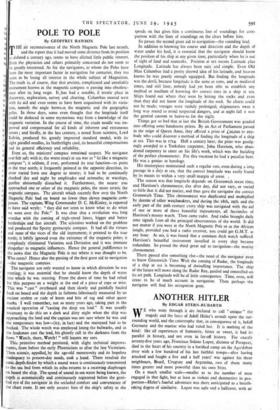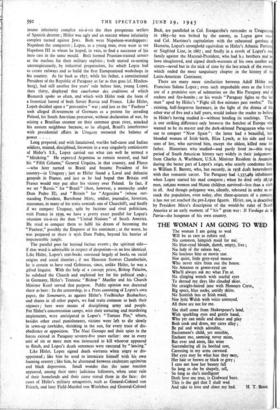ANOTHER, HITLER
By EDGAR STERN - R U BARTH
WE who went through it ate inclined to call " unique " the tragedy and the farce of Adolf Hitler's assault upon the sur- rounding world, and the catastrophe that, in consequence of it, befell Germany and the maniac who had ruled her. It is nothing of the kind: like all experiences of humanity, bitter or sweet, it had its parallel in history, and not even in far-off history. For exactly seventy-five years ago, Francisco Solano Lopez, dictator of Paraguay, died in the heart of his country in a fortified camp on the Agirdaban river with a few hundred of his last faithful troops--after having attacked and fought a five and a half years' war against his three neighbours, Brazil, Uruguay and Argentina, _two of them many times greater and more powerful than his own State.
On a much smaller scale—smaller as to the number of men engaged in that fight, but at least as violent and destructive in pro. portion—Hitler's fearful adventure was there anticipated to a breath- taking degree of similarity. Lopez was ugly and a halfcaste, with an insane inferiority complex vis-à-vis the then prosperous settlers of Spanish descent; Hitler was ugly and an outcast whose inferiority complex turned against Jews. Both were Napoleon-worshippers: Napoleon the conqueror ; Lopez, as a young man, even went to see Napoleon III in whom he hoped, in vain, to find a successor of his hero cast in the same mould. Both formed Prussian-trained armies as the nucleus for their military exploits ; both started re-arming unconspicuously, by industrial preparations, for which Lopez had to create railways and to build the first Europeanised workshops in his country. As far back as 1857, while his father, a constitutional President of the Republic of Paraguay as far as that goes (cf. Hinden- burg), had still another five years' rule before him, young Lopez, then thirty, displayed that cauchemar des coalitions of which Bismarck spoke so often, and which with Hitler took the form of a frenetical hatred of both Soviet Russia and France. Like Hitler, Lopez decided upon a " preventive " war ; and just as the " Fuehrer " took alleged ill-treatment of Germans as a pretext for invading Poland, his South American precursor, without declaration of war, by seizing a Brazilian steamer on their common great river, attacked his eastern neighbour because, so he alleged, Brazil's interference with presidential affairs in Uruguay menaced the balance of power - • . .
Long prepared, and with fanaticised, warlike half-caste and Indian soldiers, trained, disciplined, forsworn in a way singularly reminiscent of Hitler's S.S., Lopez carried out what can well be termed a "blitzkrieg." He expected Argentina to remain neutral, and had his "Fifth Column," General Urquiza, in that country, and Flores —who later turned to Brazil and became President of his country—in Uruguay ; just as Hitler found a Laval and defeatist generals in France, and just as he had hoped that Britain and France would stay put after his victory over Poland. In fact, if we set " Russia " for " Brazil " (then, however, a monarchy under Dom Pedro H), and " Britain " for " Argentina " (whose out- standing President, Bartolome Mitre, soldier, journalist, historian, statesman, in many of his traits reminds one of Churchill), and finally if we compare Uruguay, split by factions and rival politicians, with France in 1939, we have a pretty exact parallel for Lopez's situation vis-a-vis the then "United Nations" of South America. He tried to conquer them to fulfil his dream of becoming the "Fuehrer," possibly the Emperor of his continent ; at the worst, he was prepared to share it v(ith Dom Pedro, beyond his barrier of impenetrable jungle.
The parallel goes far beyond factual events ; the spiritual side— if that word is admissible in respect of despotism—is no less identical. Like Hitler, Lopez's text-books consisted largely of hocks on racial origins and social theories ; if not Houston Stewart Chamberlain, he is certain to have read Gobineau, since, unlike Hitler, he was a gifted linguist. With the help of a corrupt priest, Bishop Palacios, he subdued the Church and exploited her for his political ends ; in Germany, Hitler's Teutonic " Bishop " Mueller and his Church Minister Kerrl served that purpose. Public opinion was doctored there as here : In the censorship, in a Press consisting of Lopez's own paper, the Semenario, as against Hitler's Voelkischer Beobachter, and shares in all other papers, we find traits common to both their regimes ; here were means of disciplining army and people. For Hitler's concentration camps, with their torturing and murdering implements, were anticipated in Lopez's "Torture Pits," where, besides other cruel punishments, victims were left to die slowly in sewn-up rawhides, shrinking in the sun, for every trace of dis- obedience or opposition. The Nazi Gestapo and their spies in the forces existed in Paraguay seventy-five years earlier: one in every unit of six or more men was instructed to kill whoever appeared to flinch, and Lopez's death sentences were executed by "lancing."
Like Hitler, Lopez signed death Warrants when angry or dis- appointed; like him he used to intoxicate himself with his own foaming oratory ; like him, he alternated between exuberant optimism and black depression. Small wonder that the same reaction appeared, among their more judicious followers, when utter ruin of their homelands and their cause stared them in the face: the cases of Hitler's military antagonists, such as General-Colonel von Fritsch, and later Field-Marshal von Witzleben and General-Colonel Beck, are paralleled in Col. Estagarriba's surrender at riruguayanl in 1865—he was bribed by the enemy, as Lopez gave
and Col. Col. Martinez's capitulation with the exhausted garrison of Humaita, Lopez's stronghold equivalent to Hitler's Atlantic Fortress, or Siegfried Line, in 1867 ; and finally in a revolt of Lopez's owl family against the Marshal-President, who had h s brothers and in. laws slaughtered, and signed death-warrants of his own mother and sisters—saved but in the nick of time by the last attack of the enemy, which ended the most sanguinary chapter in the history of the Latin-American Continent.
There are many more similarities between Adolf Hitler and Francisco Solano Lopez ; even such improbable ones as the later use of a primitive sort of submarine on the Rio Paraguay and of rockets and fire-bombs ; or his words "Paraguay fights to the Iasi man" aped by Hitler's "Fight till five minutes past twelve." The . existing, half-forgotten literature, in the light of the drama of thi5 other war of five and a half years, would induce the reader to believe in Hitler's having studied it—without heeding its teachings. Tim is one striking difference only between the butcher of Europe who wanted to be its master and the dark-skinned Paraguayan who went out to conquer "New Spain ": the latter had a beautiful, hot- blooded woman of Irish 'birth, Eliza Lynch, at his side and four sons of her, who survived him, except the oldest, killed near his father. Historians who studied—and partly lived in—this tragi: period of South American history vary widely in their judgement: from Charles A. Washburn, U.S.A. Minister Resident in Asuncion during the better part of Lopez's reign, who utterly condemns hire, to William E. Barrett, who, but recently, in 1938 dzalt benevolently with that romantic career. Yet Paraguay had 1,337,489 inhabitants when Lopez started his mad conquest ; when he died only 28,746 men, to6;000 women and 86,000 children survived—less than a sixth in all. And though. polygamy was, silently, tolerated in order to re- stock the population, even today, after three-quarters of a century, it has not yet reached the pre-Lopez figures. Hither, too, is described by President Mitre's description of the would-be ruler of South America at an early moment of " his " great war: II Verdugo de Is Patria--the hangman of his own country.



























 Previous page
Previous page